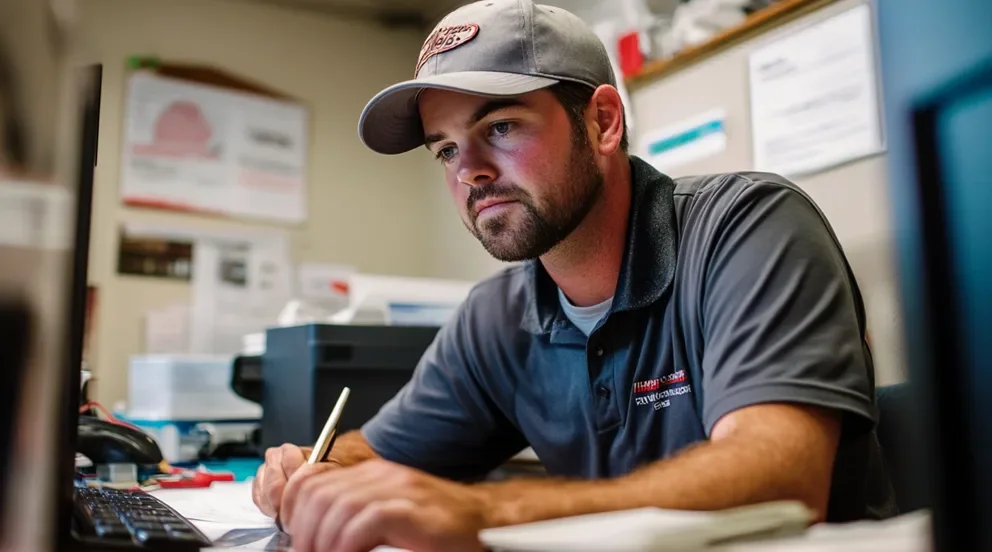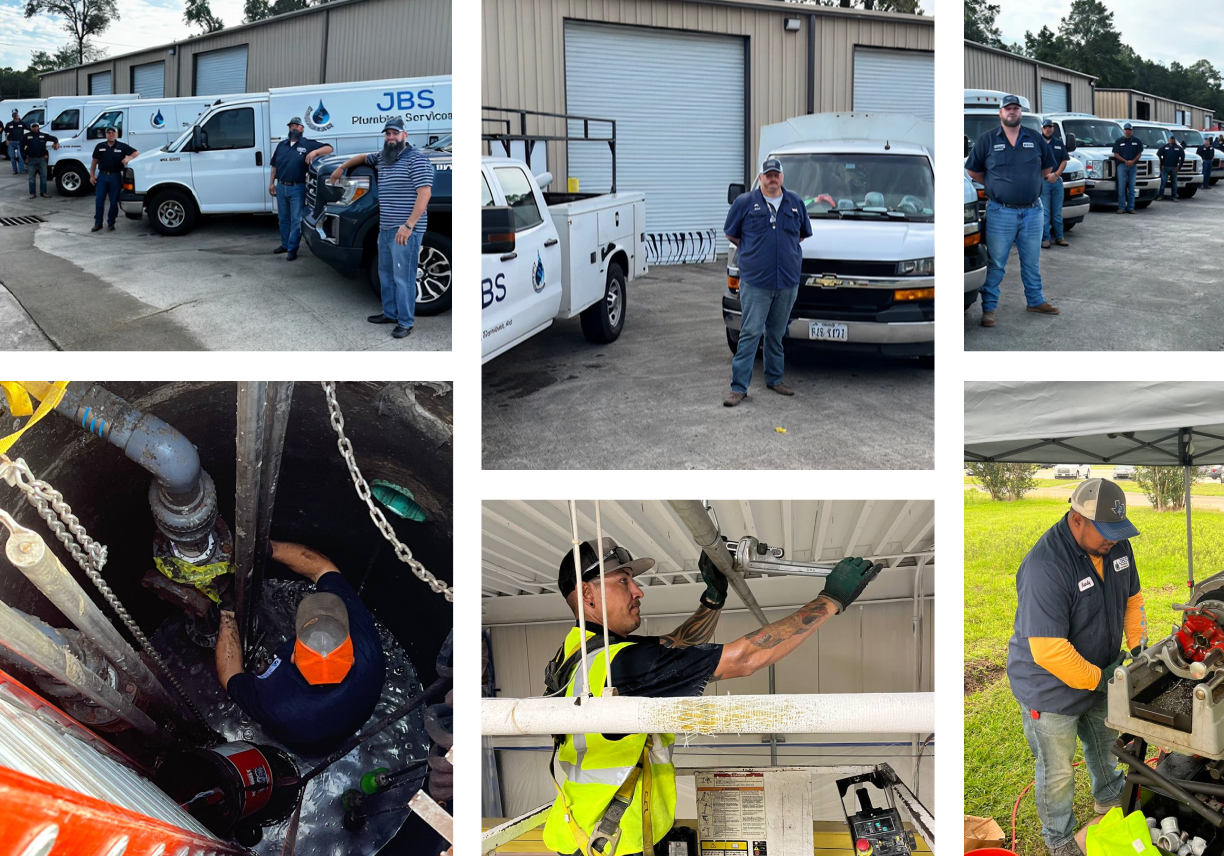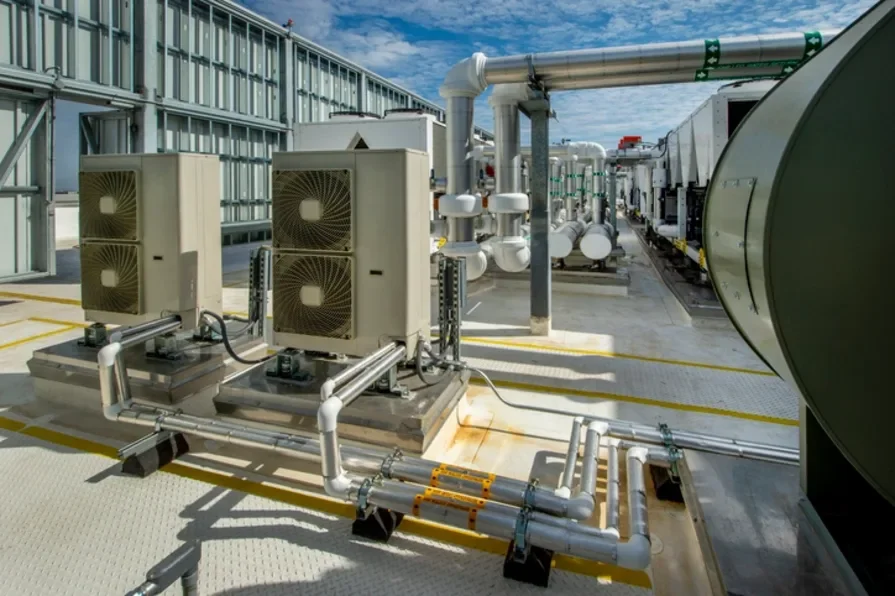Missed calls, lost job details, late invoices—plumbing businesses don’t slow down, and neither do the headaches that come with running one. When you're bouncing between emergency calls and scheduled installs, staying organized isn’t optional. That’s where a CRM and software built for the plumbing industry makes all the difference.
It keeps track of every lead, job, and customer detail so nothing gets left behind. The right CRM helps you book more jobs, follow up faster, and ensure that repeat customers are not overlooked and maintain consistent communication. But picking the wrong one? That’s just another wrench in the works.
Here’s what we’ll cover:
- Choosing the right CRM for plumbers
- 5 key features plumbers should look for in a CRM software
- 7 best CRMs for plumbers doing field work
- 5 benefits of using CRM software for plumbing
- 5 important CRM software FAQs answered for plumbing contractors
A good CRM does more than store customer names and phone numbers—it needs to fit how plumbers actually work. Whether you're a one-man shop or running a full crew, the right system helps you stay on top of every service call, keep customers in the loop, and get paid on time. But with so many options out there, how do you pick one that won’t slow you down?
Choosing the right CRM for plumbers
Not every CRM is built for the way plumbers work. Some are too complex, others don’t have the right tools to handle scheduling, job tracking, or customer follow-ups. Before committing to a system, ask yourself a few key questions to make sure it’s the right fit for your business.
- Job Management – Does the CRM make it easier to track service calls, estimates, and job progress? Can you quickly pull up past jobs for repeat customers?
- Customer Communication – Can you send automated appointment reminders, follow-ups, and invoices without extra hassle? Does it store customer history so you’re not asking for the same details over and over?
- Integration with Field Work – Can it sync with dispatching, invoicing, and inventory tracking? Does it work well with mobile apps so your team can access job details on the go?
- Ease of Use – Will your team actually use it, or does it take forever to learn? Can you enter job details in a few clicks, or are you stuck navigating endless menus?
- Features – Beyond the basics, does it have real-time scheduling, job tracking, and automated customer updates? Can it help streamline fieldwork, reduce missed appointments, and improve overall efficiency?
Your CRM system should be a key part of how you run your business, not just a place to store customer info. The right features make all the difference, so let’s break down the five key ones every plumbing CRM should have.
5 key features plumbers should look for in a CRM software
Keeping track of customers on sticky notes and scattered invoices might have worked when you were running solo. But once the jobs pile up and the calls start coming in nonstop, things slip through the cracks. A good CRM built for plumbers keeps everything in one place—customer history, job details, schedules, and invoices—so you’re not wasting time chasing down information.
Here are five must-have features that keep plumbing businesses running tight.
1. Job & customer tracking
Ever had a customer call about a water heater you "fixed" last year, but you can’t remember what was done? A CRM with job and customer tracking logs every service call, every part replaced, and every note from past jobs. Instead of guessing, you pull up their file, see you replaced the pressure relief valve last month, and now you know it’s time to talk about a full unit replacement. This detailed customer history is also a goldmine for sales, allowing you to proactively offer maintenance plans or upgrades based on past services, rather than waiting for a breakdown.
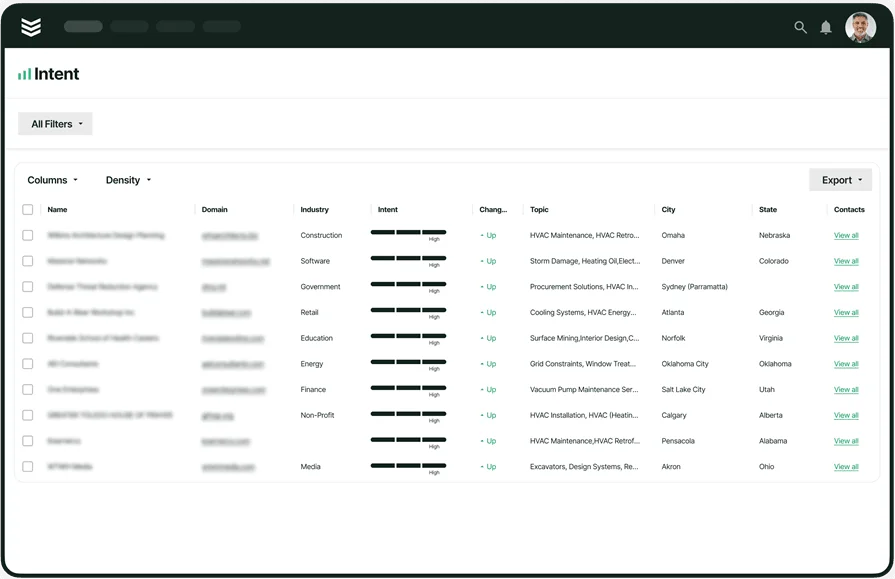
Check out our CRM tool
BuildOps teams manage their customer lists effectively to keep projects on track.
2. Automated scheduling & dispatch
One tech is finishing up a sink install, another is stuck in traffic, and a new emergency call just came in. Instead of juggling phone calls and handwritten schedules, a CRM with automated scheduling assigns jobs based on location, urgency, and availability. No more wasted drive time, no more double-booking—just a smarter way to keep your crew moving. A CRM system for small business contractors ensures that they can maximize their resources and respond promptly to customer needs, ultimately enhancing customer satisfaction and boosting the company's reputation.
3. Mobile access for on-the-go updates
Your team isn’t sitting behind a desk—they’re in crawl spaces, on roofs, and knee-deep in flooded basements. A CRM with built-in mobile access lets them update job notes, check schedules, and even send invoices straight from their phone. Say a tech finds a corroded pipe while fixing a leak—they snap a photo, log it in the CRM, and send the customer an instant estimate for additional repairs, all before leaving the job site.
4. Invoicing & payment integration
Ever chased down a customer for payment, only to hear, "I never got the invoice"? A CRM with invoicing and payment integration keeps everything logged—when the invoice was sent, if it was opened, and whether payment is overdue. So next time a customer says they didn’t get the bill, you pull up the record, hit resend, and get paid without the back-and-forth. Having a CRM is especially crucial for small service businesses where every dollar counts and chasing late payments can take valuable time away from core operations.
5. Automated follow-ups & reminders
Most homeowners don’t think about plumbing maintenance until something bursts. A CRM with automated follow-ups keeps you top of mind, reminding customers when it’s time for an annual water heater flush or drain cleaning. That way, when their pipes do need work, you’re the first call they make—not some random number they found on Google.
Other useful features for plumbing software that go beyond CRM
A good CRM does more than track customers and jobs—it should also help you handle the chaos of fieldwork. For plumbers constantly on the move, the right tools make all the difference in keeping jobs on schedule, reducing downtime, and making sure every tech has what they need. Here are three additional CRM features that make life easier in the field.
- Real-Time GPS Tracking – Knowing where your techs are at any moment helps dispatchers assign jobs smarter. When a last-minute emergency call comes in, you don’t waste time calling around—you check the CRM, see who’s closest, and send them straight to the job. No delays, no extra miles, just efficient scheduling.
- Inventory & Parts Management – Ever sent a tech out to fix a leaky faucet, only to find out they didn’t have the right cartridge? A CRM with inventory tracking keeps tabs on parts across trucks and warehouses, so plumbers know what’s on hand before heading to a job. Less back-and-forth, more jobs completed on the first visit.
- Custom Forms & Checklists – Some jobs require more than just a quick fix. A CRM with built-in digital forms and checklists ensures every step is covered—whether it’s a full system install, a compliance check, or a warranty service. No more missing signatures, forgotten steps, or lost paperwork.
7 best CRMs for plumbers doing field work
Choosing the right CRM for plumbers in the field goes beyond basic customer management—it’s about keeping jobs organized, techs on time, and cash flow steady. From emergency repairs to scheduled maintenance, the best CRM helps with dispatching, job tracking, and seamless customer communication.
1. BuildOps: best for commercial field work
Plumbers working on commercial jobs don’t just need a CRM—they need a system that connects the office, the field, and everything in between. BuildOps is built specifically for commercial service contractors, combining CRM with scheduling, dispatch, quoting, and job management. Instead of juggling multiple tools, BuildOps keeps everything in one place, helping plumbers handle bigger contracts, recurring service agreements, and complex workflows without the extra admin headaches.
How Pricing Works: Every week we offer live demos; you may also request a demo whenever it would be most handy. This will let you explore the characteristics and choose the right option for your needs.
Features Beyond CRM:
- Real-time scheduling and dispatching with drag-and-drop functionality
- AI-powered reporting tools for actionable business insights
- Technician-friendly mobile app with real-time job updates and automated checklists
What Sets It Apart For Commercial: Unlike generic CRMs, BuildOps is designed for plumbing businesses that handle commercial jobs and service contracts. From managing multi-location clients to tracking service history across large properties, BuildOps makes it easier to stay organized, cut down on admin time, and keep your team working efficiently.
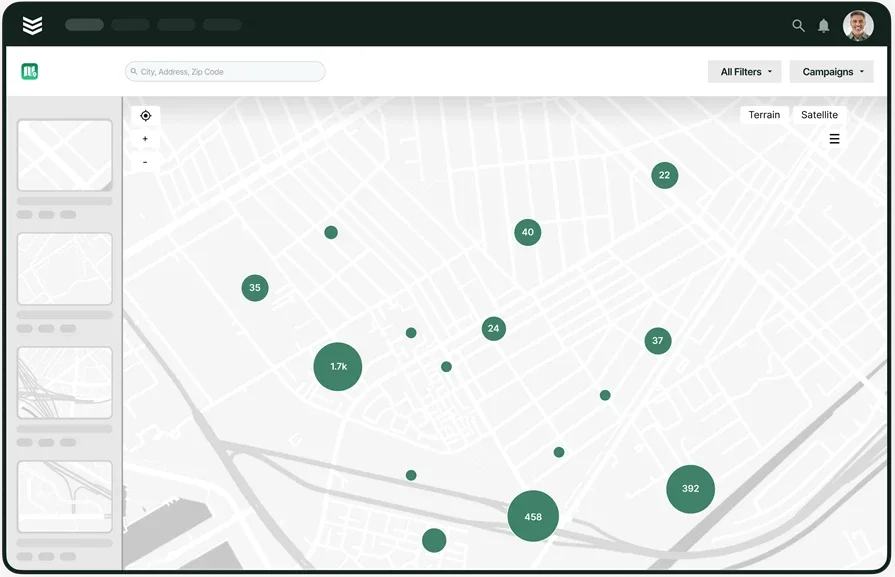
Want to see BuildOps in action?
We help modern plumbers and contractors keep their customer lists organized.
2. Jobber: best for residential fieldwork
Image Source: Jobber
Jobber is built for residential service businesses, making it a solid choice for plumbers focusing on home service work. It offers quote-to-invoice tracking, automated reminders, and an easy-to-use client portal where homeowners can book services online. While great for residential work, Jobber doesn’t have the in-depth reporting or multi-location service tracking that larger plumbing companies may need, which makes it less suited for commercial contractors.
How Pricing Works: Jobber offers various subscription plans, with pricing based on the number of users and advanced feature access.
Features Beyond CRM:
- Customer self-booking and appointment reminders
- Job tracking and GPS-based dispatching
- Automated invoicing and follow-ups
What Sets It Apart For Residential: Jobber is ideal for residential plumbers who want an easy way to manage jobs and keep homeowners in the loop with automated updates and online booking.
Find out how Jobber’s CRM platform helps residential plumbers stay organized.
3. Buildertrend: best for general contractors
Image Source: Buildertrend
Buildertrend is designed for general contractors handling large-scale projects, renovations, and new builds. It combines CRM, project management, and client communication tools into one platform, making it useful for plumbers working on construction sites or managing subcontractors. However, for service-based plumbing businesses, Buildertrend may feel too complex, as it’s more focused on long-term project tracking than day-to-day job scheduling.
How Pricing Works: Buildertrend operates on a monthly subscription model, with options to scale based on project volume and feature needs.
Features Beyond CRM:
- Project scheduling and task management
- Client and subcontractor communication tools
- Budget tracking and financial reporting
What Sets It Apart For General Contractors: Buildertrend is best for plumbers working in construction who need CRM plus project management tools to track progress, coordinate with contractors, and manage large-scale builds.
See how Buildertrend’s CRM software supports plumbers working on large-scale projects.
4. Housecall Pro: best for small plumbing businesses
Image Source: Housecall Pro
Housecall Pro is a popular choice for small plumbing businesses that need a simple, easy-to-use CRM. It offers scheduling, invoicing, and customer management, making it a solid option for plumbers just starting out or those running smaller teams. The mobile app is a standout, allowing techs to check schedules, update job notes, and collect payments in the field. However, for commercial plumbing operations handling larger contracts or recurring service agreements, it may lack the advanced reporting and dispatching features needed to stay efficient.
How Pricing Works: Housecall Pro uses a tiered subscription model, with different plans based on team size and feature needs.
Features Beyond CRM:
- Online booking and customer notifications
- Integrated invoicing and payment collection
- Simple drag-and-drop scheduling
What Sets It Apart For Small Plumbing Businesses: For solo plumbers or small teams, Housecall Pro keeps things simple—no unnecessary features, just the essentials to help manage jobs, customers, and payments.
See if Housecall Pro’s CRM platform is the right fit for your plumbing business.
5. Service Fusion: best for scalability
Image Source: Service Fusion
Service Fusion is designed for plumbing businesses looking to scale, offering a mix of CRM, scheduling, invoicing, and field service management. It’s a great choice for growing teams that need more than just job tracking—it also provides real-time communication tools and GPS tracking for better coordination. However, larger commercial operations may find it lacks the advanced reporting and contract management needed for high-volume service agreements.
How Pricing Works: Service Fusion offers tiered monthly subscription plans, with pricing based on the number of users and feature access.
Features Beyond CRM:
- Integrated VOIP phone system for better customer communication
- GPS fleet tracking for more efficient dispatching
- Customizable job status tracking
What Sets It Apart For Scalability: For plumbing companies expanding their team, Service Fusion helps keep jobs, schedules, and customer communication organized, without adding unnecessary complexity.
See how Service Fusion’s CRM feature supports growing plumbing teams. Service Fusion CRM
6, mHelpDesk: best for lead management
Image Source: mHelpDesk
mHelpDesk is built for plumbers who want to streamline their lead pipeline, offering a fast and organized way to track new customer inquiries, schedule follow-ups, and convert more jobs. It’s ideal for plumbing businesses that handle a high volume of incoming leads, with features like automated customer responses, lead tracking, and instant job estimates. However, businesses that require detailed reporting or large-scale contract management may need a more comprehensive system.
How Pricing Works: mHelpDesk runs on a subscription-based model, with pricing depending on the number of users and included features.
Features Beyond CRM:
- One-click customer estimates and invoicing
- Mobile app with offline functionality for job updates anywhere
- Automated service reminders for repeat customers
What Sets It Apart For Lead Management: For plumbers focused on turning more leads into booked jobs, mHelpDesk makes it easy to track inquiries, follow up with prospects, and close more sales—fast.
See how mHelpDesk’s CRM feature helps plumbers manage leads more efficiently.
7. FieldEdge: best for accounting integration
Image Source: FieldEdge
FieldEdge is a great fit for plumbing businesses that rely on QuickBooks, offering deep accounting integration along with CRM and field service tools. It helps keep financials and job tracking in sync, making it easier to manage invoices, payments, and profitability in one place. However, businesses that need advanced reporting or contract management for large-scale operations may need a more specialized commercial solution.
How Pricing Works: FieldEdge follows a subscription-based pricing model, with different plans based on team size and feature needs.
Features Beyond CRM:
- Two-way QuickBooks integration for real-time financial updates
- Service agreement tracking for recurring revenue
- Mobile app with job notes and invoicing capabilities
What Sets It Apart For Accounting Integration: For plumbing companies that need strong financial tracking alongside job management, FieldEdge keeps accounting and operations tightly connected.
See how FieldEdge software helps plumbers stay on top of their numbers.

Download the software scoresheet
Find the ideal fit with our easy-to-use software scoresheet.
5 benefits of using CRM software for plumbing
Without the right tools, it’s easy to lose track—missed follow-ups, forgotten job details, and delayed payments. A CRM designed for plumbers keeps everything organized, improves customer service, and ensures every job runs seamlessly from start to finish. Here’s how:
1. Keeps your pipeline full with better lead management
New jobs mean new revenue, but only if you’re keeping up with incoming leads. A CRM tracks every inquiry, automates follow-ups, and reminds you to check in with potential customers before they go elsewhere. For example, if a building owner reaches out for a quote on a repiping job but doesn’t respond right away, your CRM will automatically remind you to follow up in a few days. A simple nudge could be the difference between closing the job or losing it to a competitor.
2. Reduces no-shows with automated customer reminders
Nothing’s worse than showing up to a job only to find out the customer forgot about the appointment. A CRM automatically sends reminders via text or email, keeping customers in the loop and reducing last-minute cancellations. Instead of dealing with wasted trips and schedule gaps, your CRM will notify customers the day before their appointment and again an hour before. This ensures they’re ready when your team arrives, keeping your day running smoothly.
3. Helps you stay on top of recurring work
Regular maintenance jobs, like water heater flushes and drain cleanings, bring in easy, repeat business—but only if you remind customers when it’s time. A CRM tracks service history and sends automatic reminders, so you never miss an opportunity for repeat work. If a landlord had a boiler inspection last year, your CRM will send them a friendly reminder when it’s time for another, making it effortless to book return visits.
4. Makes customer service smoother
Customers expect fast responses, clear communication, and a company that remembers their service history. With a CRM, your team has instant access to job details, past invoices, and notes from previous visits, so customers don’t have to repeat themselves every time they call. If a homeowner reaches out about a slow-draining sink, you can quickly see in their file that they had a mainline clog six months ago. Instead of treating it like a new issue, you can recommend a camera inspection, showing them that you’re proactive and informed.
5. Saves time on admin work so you can focus on the job
Digging through paperwork, tracking payments, and following up on estimates eats into your day. A CRM automates these tasks, cutting down on admin time and giving you more hours to focus on actual plumbing work. Instead of manually sending invoices at the end of the day, your CRM auto-generates and emails them as soon as a job is completed. That means fewer delays in getting paid and more time to take on new work.
5 important CRM software FAQs answered for plumbing contractors
Running a plumbing business means keeping track of nonstop service calls, scheduling jobs without overlap, and making sure invoices don’t get lost in the shuffle. When things get busy, a CRM helps keep everything organized—customers, jobs, payments—so nothing falls through the cracks. A CRM helps organize customers, jobs, and payments, especially when things get busy. Below are answers to the most common questions plumbers have about CRM software.
1. What is CRM software for plumbing companies?
CRM software helps plumbers manage customer relationships, track job history, schedule appointments, and automate invoicing—all in one place. Instead of relying on spreadsheets or paper records, a CRM keeps everything organized and accessible, so no job or customer slips through the cracks.
2. How does CRM for plumbers work?
A plumbing CRM centralizes key tasks like:
- Logging customer details and job history
- Scheduling and dispatching technicians
- Sending automated appointment reminders
- Generating invoices and tracking payments
- Providing real-time updates from the field
This streamlines operations, reduces admin work, and helps plumbers run a more efficient business.
3. Why plumbers need CRM software
Without a CRM, it’s easy to forget follow-ups, lose track of unpaid invoices, or double-book jobs. A CRM for contractors helps plumbers ensure every lead, service call, and payment is properly logged, keeping plumbers on top of their workload. It also helps maintain customer relationships, leading to more repeat business.
4. Is CRM software worth the cost for plumbers?
Yes—CRM software pays for itself by reducing admin time, preventing missed appointments, and improving cash flow. Instead of chasing payments or sorting through paperwork, plumbers can focus on billable work. The ability to automate scheduling, invoicing, and follow-ups saves both time and money.
5. What are some best practices for plumbers to follow when implementing a CRM solution?
Rolling out a CRM for plumbers can be a game-changer, but only if it’s set up the right way. The goal is to streamline scheduling, invoicing, and customer management—not create extra headaches. Here are 10 best practices to help plumbing contractors get the most out of their CRM:
- Choose a CRM built for plumbing so it includes job tracking, dispatch, and invoicing.
- Train your team properly to ensure they know how to use the system efficiently.
- Start with essential features like scheduling and invoicing before adding more tools.
- Keep customer records updated to maintain accurate service history and contact details.
- Automate follow-ups and reminders to reduce manual tasks and secure repeat business.
- Integrate with accounting software to simplify invoicing and cash flow tracking.
- Use mobile access so techs can update job details and invoices from the field.
- Set up job status tracking to monitor progress and avoid scheduling conflicts.
- Leverage reporting tools to track performance, identify trends, and improve efficiency.
- Review and optimize regularly to ensure your CRM is evolving with your business needs.
A CRM should work for you, not against you. Following these best practices will help you get the most out of your system, keeping your plumbing business organized, efficient, and profitable.
Keeping up with service calls, juggling last-minute schedule changes, and making sure invoices don’t pile up—it’s a lot to manage on top of the actual plumbing work. A good CRM keeps your business running smoothly, tracking every customer, job, and payment so you’re not stuck playing catch-up at the end of the day.
But here’s the thing—not all CRMs are built with plumbers in mind. Many tools lack the essential features needed for field service, like real-time dispatching, job history tracking, and automated reminders. That’s where BuildOps stands out. It’s not just a CRM—it’s a complete field service platform that connects your entire operation, from the office to the job site.
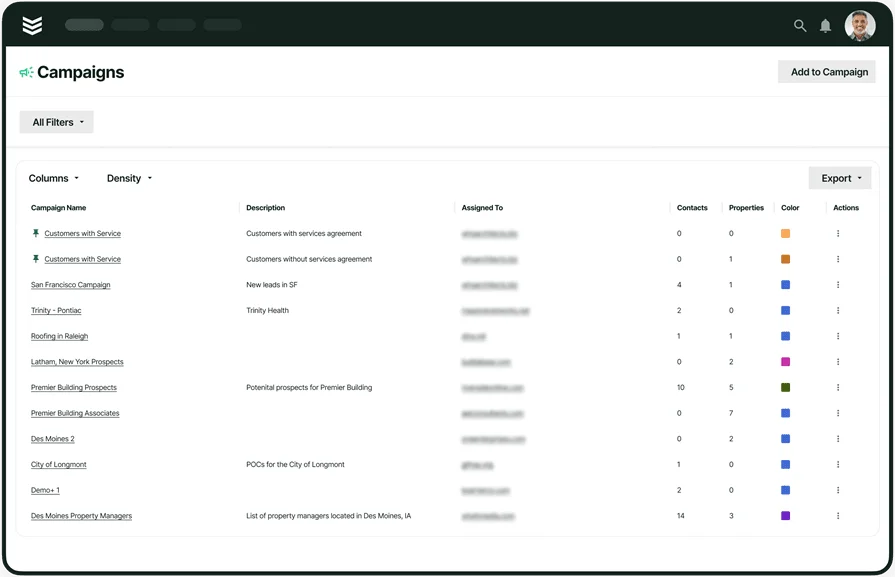
See BuildOps in action
We help teams manage jobs, customers, and their bottom line—from one place.





